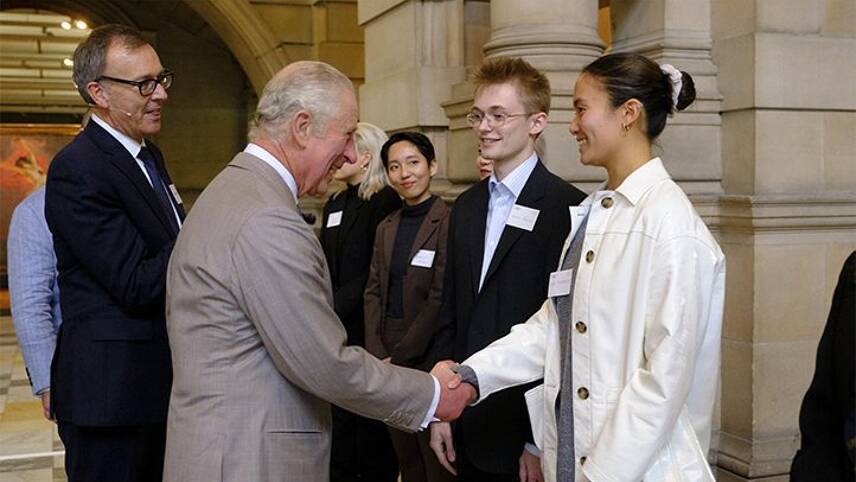Register for free and continue reading
Join our growing army of changemakers and get unlimited access to our premium content

RCA Vice Chancellor Paul Thompson and HRH The Prince of Wales meet Terra Carta Design Lab participants in Glasgow during COP26
The Terra Carta Design Lab was launched last year in collaboration with the London-based Royal College of Art (RCA). The Royal Highness The Prince of Wales and Sir Jony Ive, former chief design officer at Apple are overseeing the Terra Carta initiative.
Students specialising in the arts, including design and architecture, will be joined by those specialising in science were selected. They received support from RCA alumni and the Prince of Wales’ Terra Carta initiative, which convenes businesses in a set of shared environmental goals and principles in responding to the twin climate and nature crises.
More than 120 submissions have been whittled down to 20 teams of RCA students that have now been invited to develop solutions aimed at combatting the climate crisis. The winning projects will be announced in April this year.
The final projects are:
1) Aerseeds – an aerial ecological restoration and reforestation solutions programme.
2) AMPHITEX – a 100% recyclable waterproof breathable textile free of harmful chemicals for the outdoor and sportswear industry.
3) Carbon Counting Club – a programme aimed at improving the transparency of the soil carbon offset market.
4) DECODE Zero Waste Manufacturing – an initiative designed to use every inch of fabric in the creation of a garment.
5) Digit– a digital twin for transparent energy use in buildings.
6) FloatSync – a mechanical recycling solution for plastics sorting and handling.
7) Home Grown– a bio-based touchpad creating a global impact on e-waste whilst promoting local resources, craft and communities.
8) inC2 – software as a service that uses the blockchain to analyse supply chain emissions.
9) Notpla Seaweed Paper Project – using seaweed for packaging applications that are biodegradable.
10) OR:BITAL BLOOM – a data-driven artwork which ‘blooms’ in response to corporate and organisational adherence to sustainability targets and carbon emission reductions.
11) Primordial – a scalable photobioreactor technology for the cultivation of algal biomass, which can be used for sustainable fuels, food, and feedstock for agriculture and aquaculture.
12) Race for the Arctic – A gamified documentary that places users across the next 50 years of environmental, geopolitical and social conflict on the polar silk road.
13) Resting Reef – a cemetery that regenerates marine biodiversity, sequesters carbon and prevents coastal erosion
14) Shellworks – exploring bacteria to create compostable materials.
15) Swerve – an engagement platform that uses technology for innovative storytelling.
16) The Tyre Collective – monitoring of tyre wear to assist with zero-emission mobility.
17) WEIRD ECOLOGIES – research consultancy that works with communities to manage toxic areas.
18) Xellyfish – a creature-like device which extracts microplastics from throughout the water column.
19) XO Materials – a materials initiative that cools buildings without consuming energy.
20) ZELP – a wearable device for cattle to neutralise methane emissions.
Sir Jony Ive, Chancellor of the Royal College of Art, said: “The Design Lab is a visionary and imaginative way of helping address the increasingly urgent climate crisis – the greatest design challenge we face. This work demonstrates the ingenuity and creative brilliance of RCA students, and I am so very excited to see these concepts develop.”
Under the Terra Carta, ten industry-led ‘Transition Coalitions’ have notably been developed to create sector-specific action plans.
Matt Mace


Please login or Register to leave a comment.